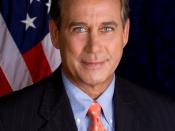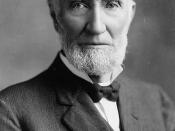B. general characteristics of subsequent evolution
1. congress generally dominant over presidency until 20th century
a. exceptions: A. Jackson, A. Lincoln, T. Roosevelt, and W. Wilson
2. major political struggles where in congress
a. issues of national significance, e.g. slavery, admission of new state's, internal improvements, tariffs, business regulation
b. conflict over distribution of power in congress
(1) centralization if quick and decisive action needs
(2) decentralization if members and constituency interests are dominant
(3) general trend in 20th century toward decentralization
C. Phase one: the powerful house of rep.
1. by early 1800s house asserts dominance; originated most legislation, nominated presidential candidates, speaker of house becomes powerful
2. party caucuses shaped policy questions, selection of party candidate for presidency made presidents quite sensitive to congressional desires
D. Phase 2: A divided house
1. assertiveness of A. Jackson, vetoed bills he didn't like
2. caucus system for picking president candidate disappears, replaces with national nominating conventions.
3. issue of slavery and civil war shatter party unity, limiting speaker's power
4. radical republicans impose harsh measures on post civil war south and voted to impeach president Johnson
E. phase 3: rise of a powerful speaker
1. end of 19th century speaker gains broad powers
a. selected chairmen and members of all committees rewarded friends and punished enemies.
b. chaired rules committee
c. decided what bills would come up for vote and what limitations on debate would be
d. decided who could speak on floor of house
F. phase 4: revolt against the speaker
1. early 20th century speaker stripped of power to appoint committee members and chairmen, membership on powerful rules committee taken away.
2. power cost by speaker emerged in other places.
a. party caucus; leader influential and respected reasserted a party unity
b. rules committee, decided what...


